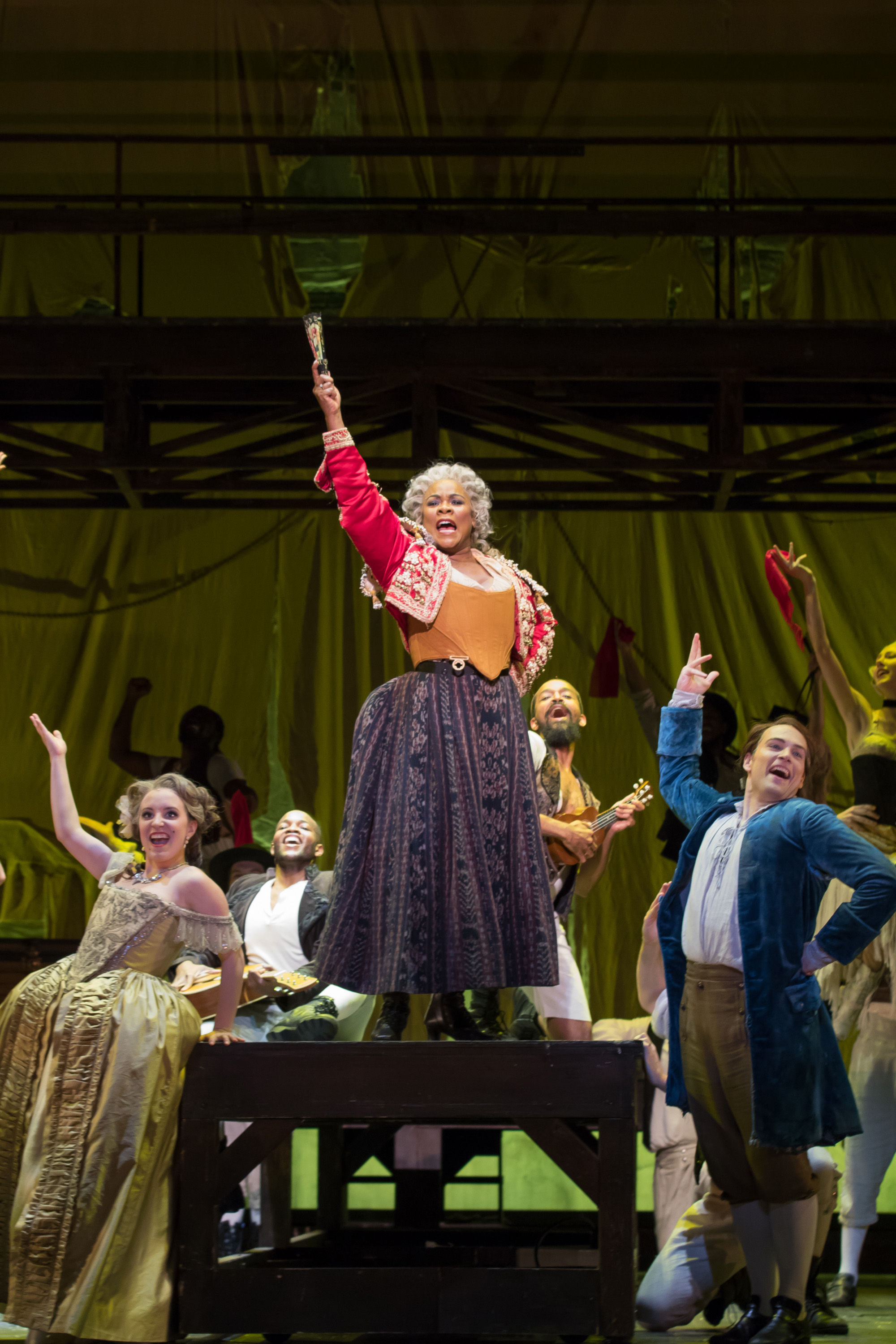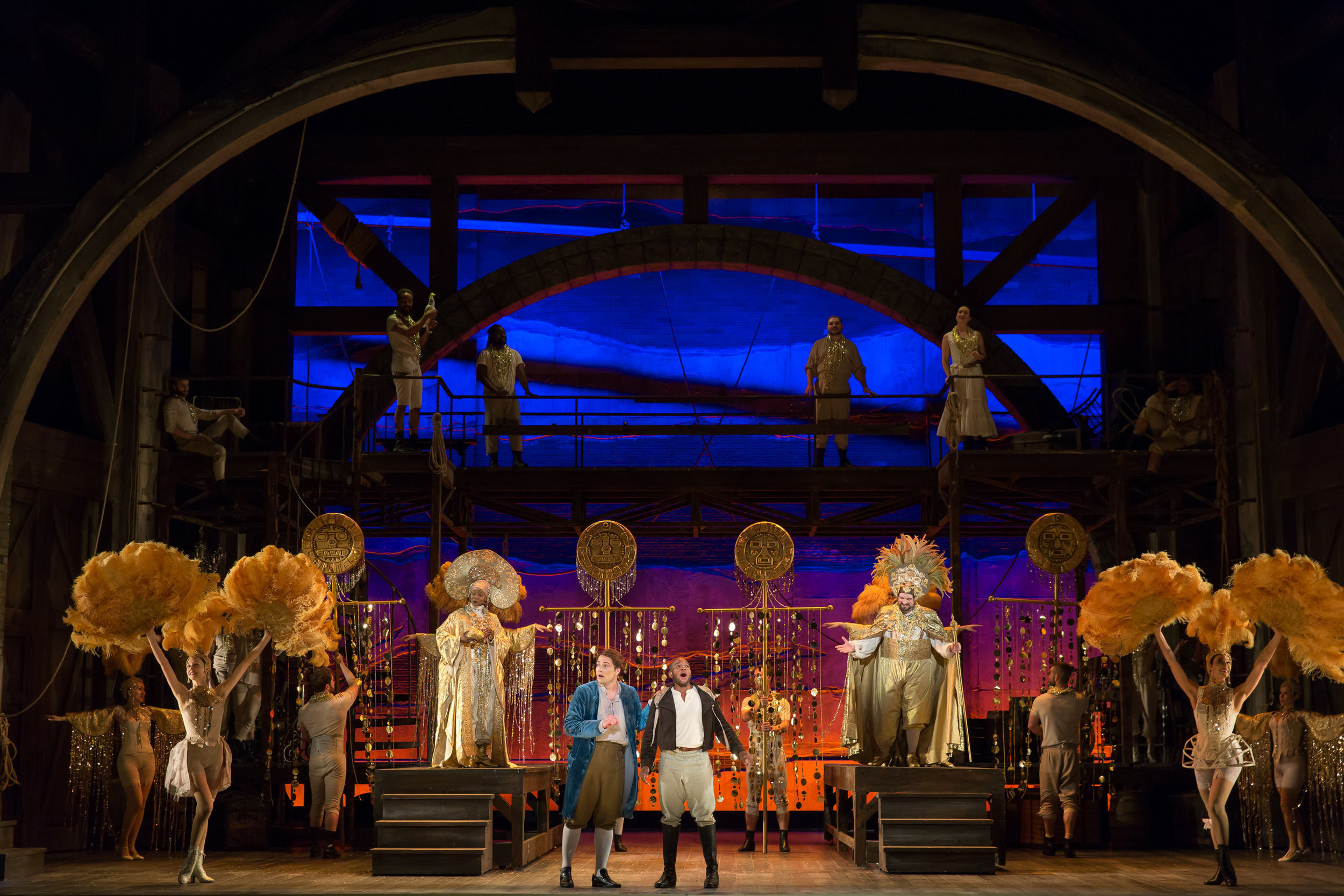So, get this: Leonard Bernstein and one of his lyricists, so many of them for this show, use his…uh…what shall we call it…opera? operetta? singspiel? musical? Oh, never mind; in Candide, they rhyme bottle with Aristotle. That could be the best of all possible blog reports right there, except I also want to discuss the singing and stuff. I have written a few poems for my own enjoyment over the years, and I never thought of using bottle and Aristotle, either to rhyme or as belonging in the same refrain, but then Bernstein and his cronies were a clever group; they not only used bottle but then filled it with bourbon. Throughout, Candide makes excellent use of juxtaposing the commonplace with philosophy and history for comedic effect, and then adding acting, singing, dancing, sets, costumes, lighting, etc. to produce a bit of a pill, but also a rather good opera, operetta, singspiel, or musical and a splendid night’s entertainment, and a rather charming ode to Mr. Bernstein for his centennial celebration ongoing this year at the Kennedy Center.
The frontispiece of the 1759 edition published by Sirène in Paris, which reads, "Candide, or Optimism, translated from the German of Dr. Ralph." Copied from Wikipedia, in public domain.
Candide is of course based on Voltaire’s very popular classic novella know by the same name ( formally titled "Candide, ou L'Optimisme" (1759)). Bernstein’s score and the libretto has undergone multiple revisions since its premiere in 1956, both by his hands and many collaborators. Here is how the Kennedy Center program gives credit: Music by Leonard Bernstein/Book Adapted from Voltaire by Hugh Wheeler/ in a New Version by John Caird/Lyrics by Richard Wilbur with Additional Lyrics by/Stephen Sondheim, John La Touche, Lillian Hellman, Dorothy Parker, and Leonard Bernstein. I don’t know who should get credit for bottle and Aristotle. Candide has appeared in many opera house but not the Met. The whole thing has the feel of a very good Broadway show, though more accurately, this version is a Glimmerglass show. It was put together for the Glimmerglass Festival in 2015 by WNO’s Artistic Director, Francesca Zambello, who also directs this production; kudos to her and thanks for bringing it to DC.
Candide is the main character in the story (just can’t bring myself to use the word eponymous). He is a disciple of Dr. Pangloss (Voltaire’s satire of his contemporary, mathematician and philospher Gottfried Wilhelm Liebniz) who champions optimism and believes this is the best of all possible worlds. Candide falls in love with Cunegonde and spends most of the operetta trying to reunite with her across the old and new worlds of the eighteenth century. His journey exposes him to just about all the world’s hardships and evils, and his final disillusionment is delivered by Cunegonde herself. We are given a semi-happy ending, but you may want to have your own bottle of consolation waiting at home; Aristotle won’t be much help.
Dr. Pangloss (Wynn Harmon) teaches optimism to Maximillian (Edward Nelson), Candide (Alek Shrader), Cunegonde (Emily Pogorelc), and Paquette (Eliza Bonet). Photo by Scott Suchman; courtesy of Washington National Opera.
Candide has an excellent cast. Tenor Alek Shrader’s beautiful voice keeps the entire production from ever sinking below the enjoyable level, though the production flags a bit in the middle. Colortura soprano Emily Pogorelc delivered the show stopping aria “Glitter and Be Gay” with both panache and feminine power; the audience erupted with applause and from there the train regained its momentum. Baritone Wynn Harmon anchored the production as both Voltaire and Pangloss, narrating the story the entire evening. I think a couple of hours of narration weakened his voice for an aria late in the game. Nonetheless, his palpable confidence and control in playing to the audience was very winning for himself and the performance as a whole. There are a host of other players who deserve mention for their contributions, perhaps first with Denyce Graves who plays The Old Lady with winning appeal, as does Edward Nelson as Maxmillian, Frederick Ballantine as Cacambo, Matthew Scollin as James/Martin, Eliza Bonet as Paquette, Alexander McKissick as the Grand Inquisitor/Governor, and Keriann Otano as the Baroness/Vanderdendur.
Emily Pogorelc as Cunegonda and Alek Shrader as Candide. Photo by Scott Suchman; courtesy of Washington National Opera.
The staging is crucial to both the telling and the appeal of the story and here the production excels. The set is simple, a stage frame with props brought in as needed. The key and a highly successful element is the use of a group of players titled as soloists who were dressed mainly in simple, white eighteenth century undergarment costumes and who without speaking performed as our most excellent servers for the evening, adding vocals, background, context, and humor – even serving as animals when needed. Like Mr. Shrader’s voice, they sustained our interest and amusement. Kudos to all: Andrea Beasom, Tom Berklund, Jaely Chamberlain, Andrew Harper, Katherine Henley, Michael Hewitt, Nicholas Houhoulis, Jarrod Lee, Danny Lindgren, Alison Mixon, Ameerah Sabreen, Louisa Morrison Waycott. The dance and movements of over twenty performers around the stage were excellently choreographed by Eric Sean Fogel. The Washington Opera Chorus also contributed to the operetta's impact, especially in the ensemble numbers "Auto da fe", "Easily Assimilated", and "El Dorado"; kudos to Chorus Master Steven Gathman.
left: Emily Pogorelc as Cunegonde, Denyce Graves as The Old Lady, and Alek Shrader as Candide. right: Alek Shrader as Candide and Frederick Ballentine as Cacambo visit El Dorado. Photos by Scott Suchman; courtesy of Washington National Opera.
Leonard Bernstein’s music for Candide is well worth a listen and Conductor Nicole Paiement and the Washington National Opera Orchestra performed it with energy and enthusiasm that buoyed the performance. I will always love Bernstein for West Side Story, and while Candide doesn’t reach that level, it adds to my appreciation for him.
Cast of WNO's Candide. Photo by Scott Suchman; courtesy of Washington National Opera.
In the end, after Candide and we have been disillusioned by the world and his own true love Cunegonde, he and we need emotional rescue. We are only offered a raft to move forward with. It feels like we have been through the stages of grief and arrived at acceptance as our raft, though we hopefully have years to go and miles to sail the raft, doing what we can to add value and meaning to our lives. The closing refrain goes
“We're neither pure, nor wise, nor good
We'll do the best we know.”
And if while we row, we can rhyme bottle with Aristotle, we can make it through, especially if the bottle is filled with bourbon.
The Fan Experience: Candide has eight more performances: May 9, 12, 14, 18, 20, 22, 24, and 26.
For the first time, I took the subway to see a WNO production. I picked up the Silver Line at Tyson’s Corner and when exiting at Foggy Bottom I spotted the red Kennedy Center shuttle buses directly ahead on 23rd street, couldn’t be easier. The shuttles run every fifteen minutes and my guess is there is always one waiting. The shuttle dropped us at the Hall of Nations entrance. I had a ride home and didn’t take the subway home, but I suspect there might be a waiting line to get on the return shuttles. My trip down took about an hour overall door to door. It was definitely less stressful than driving.






